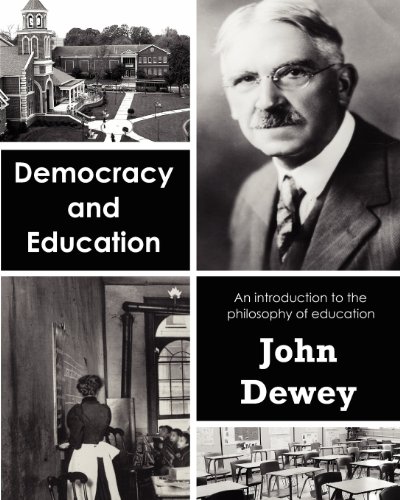Items related to Democracy and Education

John Dewey (1859–1952), writer of Democracy and Education, was an American philosopher, psychologist, and educational reformer whose ideas have been very influential to education and social reform. John Dewey, along with Charles Sanders Peirce and William James, is recognized as one of the founders of the philosophy of pragmatism and of functional psychology. He was a major representative of the progressive and progressive populist philosophies of schooling during the first half of the 20th century in the USA. Although John Dewey is known best for his publications such as Democracy and Education, he also wrote about many other topics, including Experience and Nature, Art and Experience, Logic and Inquiry, Democracy, and Ethics. In his advocacy of democracy, John Dewey considered two fundamental elements—schools and civil society—as being major topics needing attention and reconstruction to encourage experimental intelligence and plurality. John Dewey asserted that complete democracy was to be obtained not just by extending voting rights but also by ensuring that there exists a fully-formed public opinion, accomplished by effective communication among citizens, experts, and politicians, with the latter being accountable for the policies they adopt. John Dewey's most significant writings were "The Reflex Arc Concept in Psychology" (1896), a critique of a standard psychological concept and the basis of all his further work; Democracy and Education (1916), his celebrated work on progressive education; Human Nature and Conduct (1922), a study of the function of habit in human behavior; The Public and its Problems (1927), a defense of democracy written in response to Walter Lippmann's The Phantom Public (1925); Experience and Nature (1925), John Dewey's most "metaphysical" statement; Art as Experience (1934), John Dewey's major work on aesthetics; A Common Faith (1934), a humanistic study of religion originally delivered as the Dwight H. Terry Lectureship at Yale; Logic: The Theory of Inquiry (1938), a statement of John Dewey's unusual conception of logic; Freedom and Culture (1939), a political work examining the roots of fascism; and Knowing and the Known (1949), a book written in conjunction with Arthur F. Bentley that systematically outlines the concept of trans-action, which is central to his other works. While each of these works focuses on one particular philosophical theme, John Dewey included his major themes in most of what he published. John Dewey published more than 700 articles in 140 journals, and approximately 40 books. His main interests were: Philosophy of education, Epistemology, Journalism, and Ethics. *Wiki References
"synopsis" may belong to another edition of this title.
About the Author:
En 1881 se trasladó a Baltimore y se matriculó en la Universidad Johns Hopkins. Le influyó especialmente el ambiente hegeliano de la universidad. La huella de Hegel se refleja en tres rasgos que le influyeron poderosamente: el gusto por la esquematización lógica, el interés por las cuestiones sociales y psicológicas, y la atribución de una raíz común a lo objetivo y a lo subjetivo, al hombre y a la naturaleza. En 1884 obtuvo el doctorado por una tesis sobre Kant. También fue influenciado por ideas evolucionistas derivadas de Darwin. Se casó con una antigua alumna llamada Alice Chipman, la cual contribuyó más que nadie a interesar a Dewey en los temas educativos y colaboró estrechamente con él. En 1894 se trasladó a la Universidad de Chicago, en donde fraguó su definitivo interés por la educación. En 1900 asume la enseñanza del curso de Pedagogía en la Universidad de Nueva York, que estrenaba su Escuela de Pedagogía; el año 1904 renunció a su puesto como profesor. Su último destino como docente sería la Universidad de Columbia. Con 87 años se casó por segunda vez y adoptó a dos niños. Fue un hombre de acción, que aspiraba a la unificación de pensamiento y acción, de teoría y práctica. Defendió la igualdad de la mujer, incluyendo el derecho al voto. Fue cofundador, en 1929, de la Liga para una acción política independiente, fomentó el sindicalismo docente, alentó la ayuda a los intelectuales exiliados de los regímenes totalitarios. Dewey tuvo una gran influencia en el desarrollo del progresismo pedagógico, desempeñando un papel protagonista que abarca desde finales del XIX hasta la Primera Guerra Mundial. Fue el pedagogo más original, renombrado e influyente de los Estados Unidos y uno de los educadores más perspicaces y geniales de la época contemporánea, influyendo en el curso de tres generaciones. El padre de la psicología progresista murió el 1 de junio de 1952 con 92 años de edad.
"About this title" may belong to another edition of this title.
- PublisherCreateSpace Independent Publishing Platform
- Publication date2012
- ISBN 10 1475158173
- ISBN 13 9781475158175
- BindingPaperback
- Number of pages152
- Rating
Buy New
Learn more about this copy
£ 16.49
Shipping:
£ 10
From United Kingdom to U.S.A.
Top Search Results from the AbeBooks Marketplace
Democracy and Education: An Introduction to the Philosophy of Education
Published by
Createspace
(2012)
ISBN 10: 1475158173
ISBN 13: 9781475158175
New
Paperback
Quantity: 1
Seller:
Rating
Book Description Paperback. Condition: Brand New. 152 pages. 10.00x8.00x0.35 inches. In Stock. This item is printed on demand. Seller Inventory # 1475158173
Buy New
£ 16.49
Convert currency

